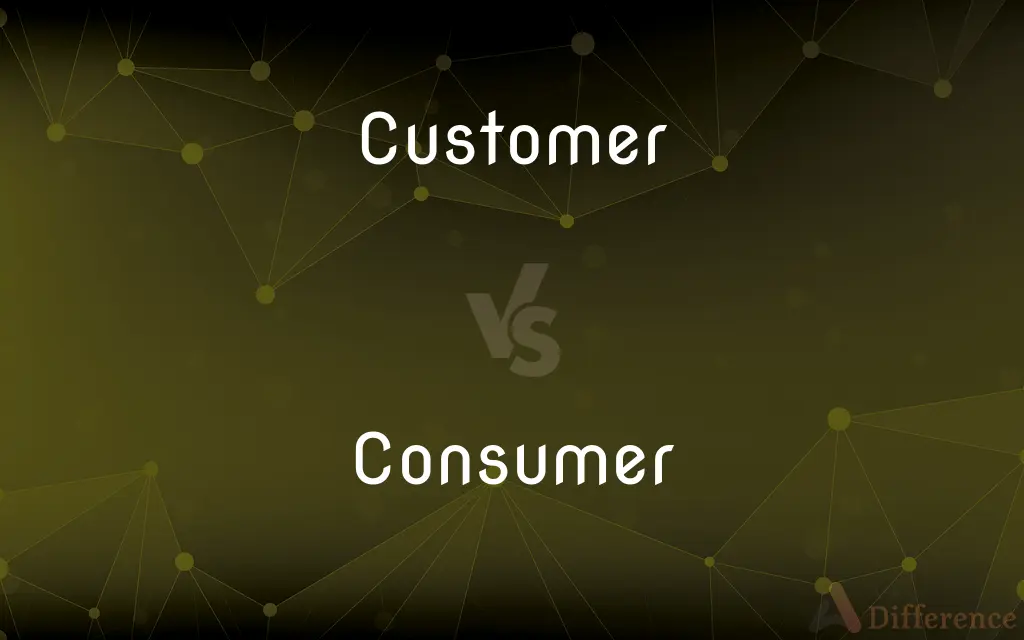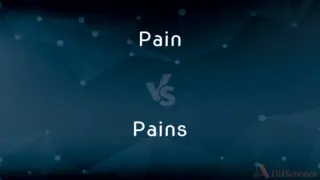Customer vs. Consumer — What's the Difference?
Edited by Tayyaba Rehman — By Fiza Rafique — Updated on September 25, 2023
A customer is someone who buys goods or services, while a consumer is someone who uses or consumes them. They can be the same person, but not always.

Difference Between Customer and Consumer
Table of Contents
ADVERTISEMENT
Key Differences
A customer is someone who engages in a transaction, purchasing goods or services from a seller. This individual pays for the item or service but might not be the end-user. On the other hand, a consumer is the one who actually uses or consumes the product or service. It's crucial to recognize that while all consumers can be customers, not all customers are consumers.
In many scenarios, the distinction between a customer and a consumer becomes quite evident. For instance, when a parent buys a toy for their child, the parent is the customer, but the child, who plays with the toy, is the consumer. Both terms, although sometimes used interchangeably, have their unique implications, especially in marketing and business contexts.
Companies often target their marketing efforts towards the consumer, focusing on the benefits and features of the product or service that appeal to the end user. However, in sales strategies, understanding the needs and motivations of the customer becomes paramount. For businesses, it's imperative to recognize and cater to both the customer and the consumer.
Comparison Chart
Role
Engages in the transaction.
Uses or consumes the product/service.
Connection to Product
Buys the product or service.
Utilizes or experiences the product/service.
ADVERTISEMENT
Marketing Focus
Purchase motivations, loyalty, payment methods.
Benefits, usability, experience with the product.
Example Scenario
A school buying textbooks.
Students reading those textbooks.
Dependency
Can be separate from the consumer.
Always involved in the consumption process.
Compare with Definitions
Customer
Customers engage in a transactional relationship with sellers.
As a regular customer, she received discounts on her purchases.
Consumer
Consumers drive demand in the market based on their needs and preferences.
The rise in health-conscious consumers led to increased sales of organic products.
Customer
A customer provides revenue to businesses.
The software company gained a new enterprise customer this quarter.
Consumer
Consumer behavior studies how individuals make decisions to spend resources.
Studying consumer trends helps companies anticipate market shifts.
Customer
The customer's satisfaction often influences their loyalty and future purchases.
The customer's positive feedback led to increased sales.
Consumer
A consumer is the end-user of a product or service.
The consumer reported a defect in the newly bought headphones.
Customer
Customers might not always be the end-users of a product.
The company was a customer of office furniture but the employees were the users.
Consumer
Consumers might not always be the ones paying for the product.
Children are the main consumers of educational toys, though parents buy them.
Customer
In sales, commerce, and economics, a customer (sometimes known as a client, buyer, or purchaser) is the recipient of a good, service, product or an idea - obtained from a seller, vendor, or supplier via a financial transaction or exchange for money or some other valuable consideration.
Consumer
Feedback from consumers helps businesses improve their offerings.
The software was updated based on consumer feedback.
Customer
A person who buys goods or services from a shop or business
Mr Harrison was a regular customer at the Golden Lion
Consumer
A consumer is a person or a group who intends to order, orders, or uses purchased goods, products, or services primarily for personal, social, family, household and similar needs, not directly related to entrepreneurial or business activities.
Customer
A person of a specified kind with whom one has to deal
He's a tough customer
Consumer
One that consumes, especially one that acquires goods or services for direct use or ownership rather than for resale or use in production and manufacturing.
Customer
One that buys goods or services, as from a store or business.
Consumer
(Ecology) A heterotrophic organism that ingests other organisms or organic matter in a food chain.
Customer
(Informal) An individual with whom one must deal
That teacher is a tough customer.
Consumer
One who, or that which, consumes.
Customer
(obsolete) A habitual patron, regular purchaser, returning client; one who has a custom of buying from a particular business.
Consumer
(economics) Someone who trades money for goods or services as an individual.
This new system favours the consumer over the producer.
Customer
A patron, a client; one who purchases or receives a product or service from a business or merchant, or intends to do so.
Every person who passes by is a potential customer.
Consumer
(by extension) The consumer base of a product, service or business.
Our consumers are upwardly mobile and middle-class.
Customer
(informal) A person, especially one engaging in some sort of interaction with others.
A cool customer, a tough customer, an ugly customer
Consumer
(ecology) An organism (heterotroph) that uses other organisms for food in order to gain energy.
Customer
A native official who exacted customs duties.
Consumer
One who, or that which, consumes; as, the consumer of food.
Customer
One who collect customs; a toll gatherer.
The customers of the small or petty custom and of the subsidy do demand of them custom for kersey cloths.
Consumer
The person or organization that uses some item of commerce or service in its own acitities, as opposed to reselling the item or including it as part of another item for resale; - called also the end user.
Customer
One who regularly or repeatedly makes purchases of a trader; a purchaser; a buyer.
He has got at last the character of a good customer; by this means he gets credit for something considerable, and then never pays for it.
Consumer
A person who uses goods or services
Customer
A person with whom a business house has dealings; as, the customers of a bank.
Customer
A peculiar person; - in an indefinite sense; as, a queer customer; an ugly customer.
Customer
A lewd woman.
Customer
Someone who pays for goods or services
Customer
A customer is an individual or entity that purchases a product or service.
The bookstore had a loyal customer who visited every week.
Common Curiosities
How do businesses gather feedback from consumers?
Methods include surveys, reviews, focus groups, and direct feedback.
Are businesses considered customers?
Yes, businesses can be customers when they purchase products or services from other businesses.
Can the customer and consumer be the same person?
Yes, when someone buys and then uses a product, they are both the customer and consumer.
Who benefits more from product warranties, the customer or consumer?
While the customer might make the purchase based on the warranty, it's the consumer who benefits when using the product.
Why is the distinction between customer and consumer important in marketing?
Differentiating allows businesses to tailor strategies for purchasing decisions and product usage.
How do consumer rights affect the customer?
If a product is returned or exchanged due to consumer rights, the customer might be involved in the transaction process.
Why might businesses offer loyalty programs to customers?
Loyalty programs incentivize repeat purchases and enhance the long-term relationship with customers.
How do product recalls affect consumers?
Recalls directly impact consumers, as they might need to stop using or return the defective product.
Can a product have multiple consumers but only one customer?
Yes, for instance, a school might buy a software license (customer) used by all its students (consumers).
How do companies use consumer feedback?
Feedback is used to improve products, tailor marketing strategies, and enhance overall user experience.
What is "consumer behavior"?
It's the study of how individuals decide what products to purchase and consume based on various factors.
How do businesses ensure customer satisfaction?
They may offer quality products, exceptional service, return policies, and responsive customer support.
Who drives product innovation, customers or consumers?
Both can influence innovation - customers with their purchasing choices and consumers with their usage feedback.
Are customer preferences always aligned with consumer needs?
Not always. A buyer might prioritize price, while the end-user might prioritize functionality or quality.
Who is more concerned with product safety, the customer or consumer?
Both may be concerned, but the consumer, as the end-user, often has a direct experience with product safety.
Share Your Discovery

Previous Comparison
Pain vs. Pains
Next Comparison
Agree vs. ConsentAuthor Spotlight
Written by
Fiza RafiqueFiza Rafique is a skilled content writer at AskDifference.com, where she meticulously refines and enhances written pieces. Drawing from her vast editorial expertise, Fiza ensures clarity, accuracy, and precision in every article. Passionate about language, she continually seeks to elevate the quality of content for readers worldwide.
Edited by
Tayyaba RehmanTayyaba Rehman is a distinguished writer, currently serving as a primary contributor to askdifference.com. As a researcher in semantics and etymology, Tayyaba's passion for the complexity of languages and their distinctions has found a perfect home on the platform. Tayyaba delves into the intricacies of language, distinguishing between commonly confused words and phrases, thereby providing clarity for readers worldwide.
















































